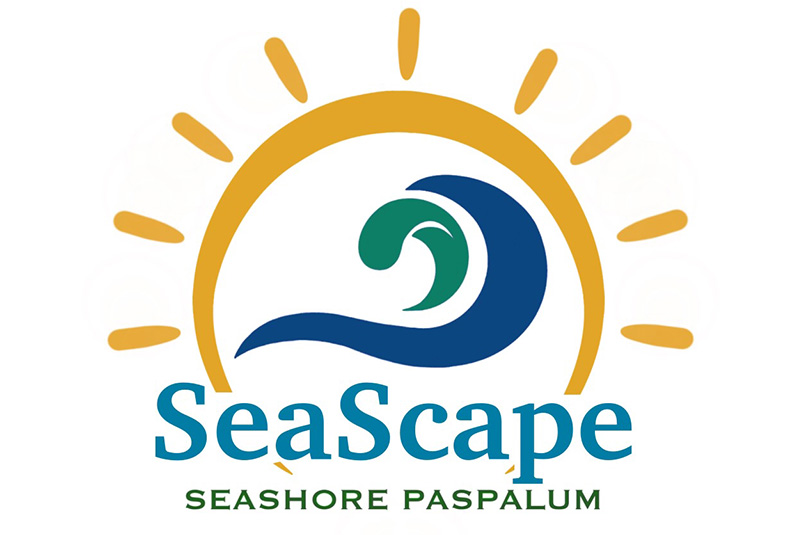
It’s not every day that a product’s name is changed once it’s released. But a special circumstance that illuminates the difficulty of product naming recently prompted the University of Georgia to announce a name change on a variety of vegetative seashore paspalum turfgrass, now called SeaScape. When the variety was originally announced in January of 2023, the grass had a different name: SeaBreeze.
The issue was that a seeded fescue with the variety name Seabreeze was already in the marketplace. Developed by Pure Seed, Seabreeze slender creeping fescue, (Festuca rubra trichophilia), was released to the market in 1992. In 2003, Pure Seed released its successor, an improved and glyphosate-tolerant fine fescue called Seabreeze GT.
How could this happen?
The SeaBreeze name was originally chosen to continue the tradition of naming UGA salt-tolerant paspalum varieties with the “Sea” prefix paired with a word that invokes images of waterfront golf courses and lawns. Earlier releases wore monikers such as SeaIsle 1, SeaIsle 2000, SeaIsle Supreme and SeaStar.
SeaScape is a vigorous vegetative seashore paspalum cultivar that produces excellent quality turf under a range of mowing heights and is suitable for use on golf courses, athletic fields, home lawns and other recreational venues as fine turf. The variety was tested under the experimental name of UGP 73 and has been under development and evaluation for 16 years. It has been evaluated extensively in the National Turfgrass Evaluation Program (NTEP) at eight southern locations from 2016-2020, and it was a decisive forerunner and as part of a USDA Specialty Crops Research Grant (SCRI) to develop improved drought- and salinity-tolerant warm-season grasses where it was tested at six southern locations from 2011-2013. In the initial two-year SCRI drought trials, UGP 73 was the top-performing entry in overall turf quality out of 80 entries. It also underwent advanced trials in SCRI at six locations in 2016-2019.
In the world of plant marketing, finding a unique name for a new plant variety can be a daunting task. According to the International Plant Names Index database, there are more than 1,433,000 named plant varieties. Finding a name that speaks to any product’s attributes is hard enough. Creating a brand name for a plant is not just limited to searching other plant names. Plant breeders compete with every other type of product to name their progeny. Even if a marketer creates a name that sounds good and tells the plant’s branding story, research must be done to ensure the name hasn’t been thought up by someone else already and if it’s available for use.
To add to the confusion, in the plant world, seeded variety names may be protected under PVP (Plant Variety Protection), while vegetatively propagated varieties are most often protected in the U.S. by filing a plant patent and/or a trademark with the U.S. Patent and Trademark Office. Although a cool-season seeded fine fescue is not likely to be confused with a warm-season vegetatively propagated seashore paspalum, Pure Seed had protected the name Seabreeze GT under PVP prior to the University of Georgia acquiring name protection under trademark. The two databases don’t cross-pollinate (pardon the pun), so the naming conflict was missed.
However, the team at Pure Seed and the turfgrass breeders at UGA have a longstanding collaborative relationship.
“Pure Seed values its long-standing partnership with the University of Georgia and their history of successful collaboration on numerous variety developments,” Crystal Rose-Fricker, president of Pure Seed and Pure-Seed Testing Inc., says. “While we recognize the importance of distinct product names for effective marketing, we believe that open dialogue and cooperation are essential to resolving any naming conflicts.”
When it was brought to his attention, Paul Raymer, Ph.D., who developed the new paspalum grass at UGA, immediately agreed to change the name. University staff weighed many combinations of words with the “Sea” prefix, searched all the databases for possible conflicts and settled on SeaScape as the new name for the university’s fifth seashore paspalum release.
“SeaScape was an excellent alternative name for our new grass variety,” Raymer says. “It contains the word ‘Sea,’ and by adding ‘Scape’ as the suffix, it makes you think of the word ‘landscape.’ As SeaScape is ideal for use on golf courses, athletic fields, home lawns and other recreational venues, it was a perfect solution.”